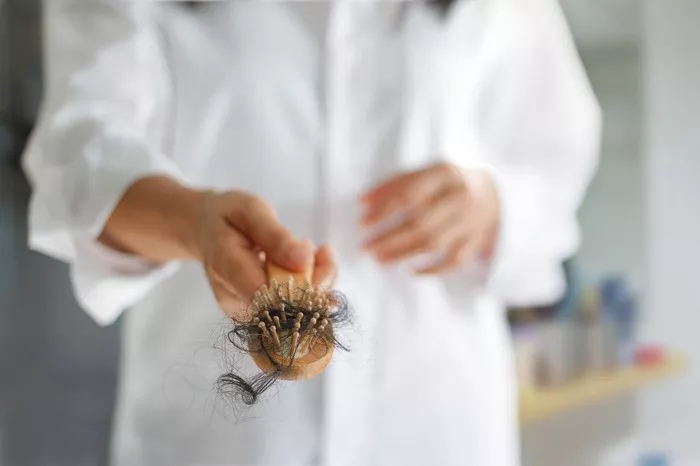Hair loss, medically known as alopecia, is a common condition that affects millions of people worldwide. While it can often be attributed to genetic factors, there are numerous underlying health issues that may contribute to or exacerbate hair loss. Understanding these potential causes is crucial for both diagnosis and treatment. In this article, we will explore various health conditions that could manifest as hair loss, shedding light on the intricate relationship between our overall health and the condition of our hair.
1. Hormonal Imbalance
Hormonal imbalance can disrupt the natural hair growth cycle, leading to excessive shedding or thinning. Conditions such as polycystic ovary syndrome (PCOS), thyroid disorders (hypothyroidism or hyperthyroidism), and hormonal fluctuations during pregnancy or menopause can all contribute to hormonal imbalances. These imbalances affect the production of androgens and thyroid hormones, which play key roles in regulating hair growth. Addressing the underlying hormonal issues is essential for managing hair loss in such cases.
2. Nutritional Deficiencies
Nutritional deficiencies can have a profound impact on hair health. Inadequate intake of essential nutrients such as vitamins (particularly B vitamins), minerals (like iron and zinc), and protein can result in weakened hair follicles and increased hair shedding. Conditions like anemia, caused by iron deficiency, are commonly associated with hair loss. A balanced diet rich in these nutrients is crucial for maintaining healthy hair growth, and supplementation may be necessary in cases of severe deficiency.
3. Stress and Anxiety
Chronic stress and anxiety can trigger a type of hair loss known as telogen effluvium, where a significant number of hair follicles enter the resting phase prematurely, leading to increased shedding. This condition is often temporary and resolves once stress levels decrease. However, prolonged or severe stress can exacerbate other underlying causes of hair loss, making stress management an important aspect of treatment.
4. Autoimmune Disorders
Certain autoimmune disorders, such as alopecia areata, result in the body’s immune system mistakenly attacking hair follicles, leading to patchy hair loss. Other autoimmune conditions like lupus can also cause hair thinning or loss as a secondary symptom. Managing these conditions typically involves immunosuppressive therapy to prevent further hair loss and promote regrowth.
5. Skin Conditions
Various skin conditions affecting the scalp can contribute to hair loss. Scalp conditions like seborrheic dermatitis, psoriasis, and fungal infections can disrupt the hair growth cycle and cause inflammation, leading to hair shedding or thinning. Proper diagnosis and treatment of these underlying skin conditions are essential for restoring scalp health and promoting hair regrowth.
6. Medications and Treatments
Certain medications and medical treatments can cause hair loss as a side effect. Chemotherapy drugs, for example, target rapidly dividing cells, including hair follicles, leading to temporary hair loss during treatment. Other medications, such as those used to treat hypertension, depression, and hormonal imbalances, can also contribute to hair thinning or shedding. In some cases, adjusting medication dosage or switching to alternative treatments may help mitigate hair loss.
7. Genetic Predisposition
Genetics plays a significant role in determining an individual’s susceptibility to hair loss. Androgenetic alopecia, also known as male-pattern or female-pattern baldness, is the most common type of hair loss and is strongly influenced by genetic factors. While the exact mechanisms underlying genetic hair loss are complex, understanding one’s family history can provide insight into the likelihood of experiencing hair loss and guide appropriate interventions.
8. Underlying Medical Conditions
Several underlying medical conditions can manifest with hair loss as a symptom. These include autoimmune diseases like lupus and celiac disease, hormonal disorders such as Cushing’s syndrome, and chronic illnesses like diabetes and kidney disease. Identifying and addressing the primary medical condition is essential for managing associated hair loss effectively.
9. Scalp Trauma or Injury
Physical trauma or injury to the scalp can damage hair follicles and disrupt the hair growth cycle, leading to localized hair loss. Common causes of scalp trauma include burns, scars from surgeries or accidents, and repeated friction or tension from hairstyles like tight ponytails or braids. Treating scalp injuries promptly and avoiding further trauma can help minimize hair loss and promote healing.
10. Environmental Factors
Exposure to certain environmental factors can contribute to hair loss. These may include exposure to pollutants, harsh chemicals, or excessive UV radiation from sunlight. Additionally, factors like extreme weather conditions, such as excessive heat or cold, can stress the hair and scalp, leading to increased shedding. Protecting the hair and scalp from environmental damage through proper care and using protective measures like hats or scarves can help prevent hair loss.
In conclusion, hair loss can be a symptom of various underlying health issues, ranging from hormonal imbalances and nutritional deficiencies to autoimmune disorders and scalp conditions. Identifying and addressing the root cause of hair loss is essential for effective management and treatment. Consulting with a healthcare professional or dermatologist can help determine the underlying cause of hair loss and develop a personalized treatment plan to promote hair regrowth and scalp health. Additionally, adopting a healthy lifestyle, managing stress, and practicing good hair care habits can help support overall hair health and prevent further loss.


